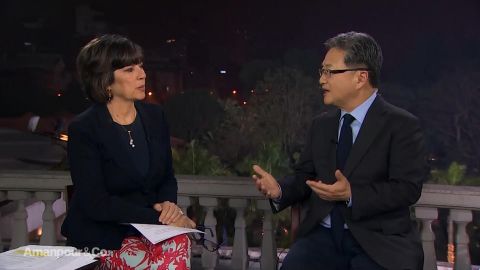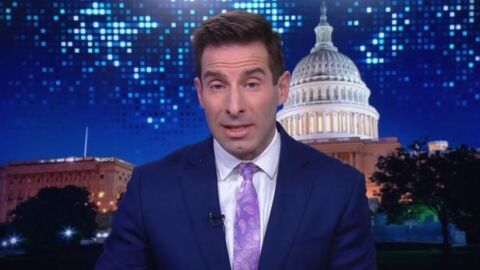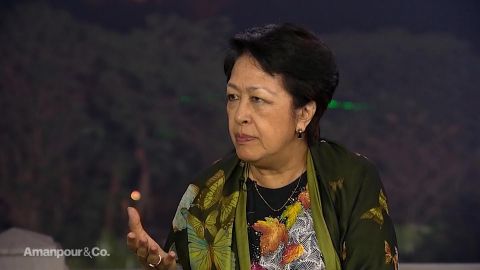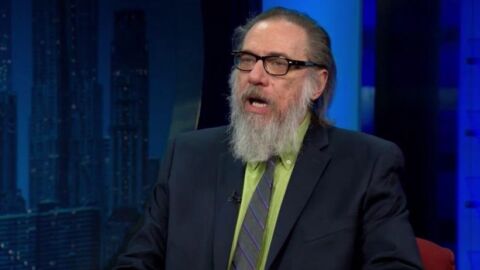Read Transcript EXPAND
When it comes to North Korea, we think of denuclearization, the survival of the Kim dynasty.
But what's comedy like in countries where dictators reign that question is central to Larry Charles, who became a comedy heavy work heavyweight by working behind the scenes on shows like Seinfeld before directing the blockbuster hit Borat.
His new docu series, Larry Charles Dangerous World of Comedy, explores how to crack jokes in places like Iraq, Syria and Yemen, maybe even North Korea.
He sat down with our Walter Isaacson to talk about what he discovered is that conversation.
Welcome to the show. Thank you so much.
So what in heaven's name possessed you to think that you could go to war zones and hang around with terrorism in order to find comedy?
I am always on a search for the thing that doesn't seem to be funny.
That could be funny.
I like to find comedy in places where things should not be really? LAUGHTER And I noticed that when Trump was elected that we were moving in this kind of isolation direction.
We were isolating ourselves from the rest of the world.
And we don't know anything about the rest of the world.
We're quite ignorant about it.
And the rest of the world knows everything about us.
And I thought that's a very interesting kind of contrast.
At the same time, I've traveled a lot, and wherever I've gone, whatever oppressive regime or religious governments I was in, we created havoc and mayhem.
But we got to leave. We got to come home to America.
We got accolades and rewards for being in these places and doing what we were doing.
But there were comedians there who left there who live there.
How do they survive?
And I began to be very curious about that question.
I meet comedians and all these countries where I would leave and they had to stay.
How do they do their comedy?
Under an oppressive regime, under a dictatorship.
And I started to do research and I started to just Google the craziest places I could think of and comedy And I found that whether it was Yemen or Syria or Somalia, there are always comedians there.
People are still practicing comedy in these places, trying to make people laugh under those conditions.
And I felt like I was uniquely qualified to talk to those kinds of people were uniquely qualified.
You say it was a culmination of a career you started in standup Why did why was this the culmination?
Well, again, I've done so many different things, and I want impact.
I don't want to just create frivolous forgettable entertainment.
I don't want to create pop or superficial type of things, especially at this point in my life.
I want to create something that has some resonance to it, that provokes people.
And I've always done that.
I've done it with just outrageous things sometimes.
But I want people to be thinking about what they're doing and what they're watching.
A little bit. I want them to carry it with them after they stop watching it.
So you watch standup comics around the world.
Was there something that was the same, or does each country have its unique brand of comedy?
Well, one thing I did learn was that whatever country I was in, Western comedy was the foundation.
They learned all they're the ideas of modern comedy from Western comedy.
Everybody in these countries knows Eddie Murphy.
They know Dave Chappelle. They know Jerry Seinfeld.
So they are using American comedy as their role model for their comedy.
But then they are turning it into an indigenous product, you know?
And so you have their common reference points, like we have hours.
If I say to you or that's like The Real Housewives, you know what I'm talking about?
They have their reference points.
So they have to take the comedy and sort of apply it to those reference points and it makes it unique and still universal at the same time.
Is oppression sort of the key to bringing out comedy?
I mean, you grew up with the great Jewish comedians of the Mel Brooks and Woody Allen, and coming from where you did, I think Brooklyn. Right.
And there's sort of a sense of, okay, there are people who are more have more authority than us.
Is that a key to comedy around the world?
I do think that, you know, people reach a point in all these situations in the in the in the Jewish pogroms or in Somalia.
What you see are people at the brink, people on the precipice, people standing on a cliff, and they are staring at an abyss in front of them.
And they have to decide, are you going to jump off into the abyss and just give up and surrender or you're going to back up a little bit?
Look around you and realize how absurd it is and process that as humor.
And I saw that that was a crucial equation.
And almost every country I was in.
One of the things that struck me was the Saudi women, you know, doing stand up comedy, which you wouldn't expect.
Let's go to a clip of that right now and then maybe you could describe it.
Love to the idea came about doing a comedy show.
And what really made me want to do the show is that I had topics.
I just did my first episode at my children room.
You're discovered by Hutton sitting in an a book fair having coffee.
This is the first time I work in my life.
She has never published before.
She only published, I think, in on Facebook.
As women, we are always the subject of men.
Standup comedy, a standup comedian.
I think all through all through history, if women did not exist, standup comedy would not have existed.
Take my wife, please.
We took all the things that we they always claim that we do.
And we just fired back.
So tell me about them.
Well, one of the most interesting things about the women in Saudi Arabia and I interviewed another female comedian who just wore the veil, the ice slut.
But talk like Sarah Silverman, what was interesting was that they couldn't perform in the stand.
There's a couple of standup clubs in Saudi Arabia, but it's for men only.
Male performers, male audience.
So what they have done is seized upon the social media to do their comedy.
They they do sketches and standup and monologues on video and put it on social media and bypass the state media that way and reach the audience around the world.
And have millions of followers as a result.
And they're not worried about a crackdown on social media.
They're hopeful in that country.
At that time, they were feeling very optimistic.
Now, by the same token.
I spoke to a comedian there who's known as the Seinfeld of Saudi Arabia, who was subsequently arrested and has disappeared and his wife, who was one of the female driving activists, was also arrested and disappeared.
This is the juxtaposition of Saudi Arabia really to the world.
They're presenting a very progressive front, but this is still going on at the same time.
So I was trying to sort of present that as well.
You have the Iraqi guy, I think it was, who was being tortured and able to use comedy with his torturers. Yes.
That's Ahmed al-Bashir, who is the relatively famous.
Right. Relatively famous.
Again, these these guys are on social media as well as television and YouTube or whatever.
And they're reaching millions and millions of people this way.
I don't think of shouting up, oh, well, how come about numbers in this year's show?
And again, it's like a calling a guy like Ahmed al-Bashir.
He doesn't become a comedian to get a pilot deal or to do a movie.
Or to do a standup tour.
He does it to heal Iraq.
He it's a calling for him.
It's a survival tool.
So when he was a child, his family was under siege.
And at war in Iraq, he was thrown out of the house during the Shock and awe campaign.
And so listening to listening to the Backstreet Boys, his dad was was a kind of a very religious man and thought he was being an infidel and kicked him out of the house during the war.
So he was a child.
And so I think that he learned survival, learned that humor could help him survive.
But he's the one who did it with his torturers. Right.
He saw people being tortured and killed and hurt.
And so just out of desperation, he made a joke with the torturers and they laughed.
And he saw.
Well, maybe that's a way that I can kind of keep alive here.
And he kept making jokes and they kept laughing, and he wouldn't wind up getting tortured.
And so it makes a human connection. Yes. Yes.
Which is what I was trying to do as well.
That's why I talk to people from ISIS or al-Shabab.
I wanted to see the human face, which is not something we see very much in the Western media.
We seen clad in black and yelling Death to America.
But these are a lot of these guys are just farmers that families were killed and they were kidnaped and forced into ISIS.
Yeah, but why would you want to humanize ISIS?
Why did you want to talk to them and get the humor out?
Well, I felt like we see the end result of terrorism.
We see the violence.
But what if we backed it up to their childhoods?
You know, what if our kids were being raised in war zones, their families being destroyed?
What kind of adult is that is going to grow up from that environment?
You know, they're going to be angry.
They're going to be hateful.
They're going to be looking for someone to blame, you know?
And so these kids are innocent.
I meet a lot of children in these countries who are as sweet and as beautiful and as innocent as any American child.
But by the time they become teenagers, everything in their life has been destroyed and they have been traumatized ized.
And it sort of takes you in a different direction.
Is there an element of humor that's supposed to be discomforting?
Well, if you've seen some of my stuff, the answer is very much yes.
I think that the it's similar to a horror movie in a way.
You're kind of cringing and you're resisting and you're holding back and you're denying and you're suppressing.
And then when the laugh comes, it's an explosion.
It's a liberation. It's a catharsis.
But sometimes it can be healing.
I know you did some of the US veterans came back.
Let's show that clip and talk about healing.
Definitely.
It took me three years to use my face where I feel like this is me.
Okay, now I know that you're like, I'm better looking now to my face.
A lot of you girls know this, buddy.
I want you go cook to your hooked but it took me a while, and it was hard for my kids.
At first.
I had to make light of it.
I had to break that awkwardness up for me too.
And then so the first thing I ever did was I bought a fart machine, a remote control fart machine.
So if I cut someone staring at me at the store or something like that, I would just push the button, like, oh, excuse me.
And their eyes light up and just walk away real fast.
Now, one of my favorites was four years ago.
They remade Nightmare on Elm Street.
You can see that, right?
I went to movies in a way to the lights came on at the end Sweet dreams, everybody it's always used that humor.
I joke around with physical therapy, occupational therapy.
That's how I dealt with the pain.
I dealt with the Joker, all the other veterans, the staff for Bobby.
LAUGHTER literally hurts, but he wouldn't have it any other way.
Tell me about Bobby.
Bobby was an amazing guy.
Bobby did four tours in Iraq, got through the first three with no problem.
And then about a week into the fourth tour, he had this incredible accent.
He was the only one that survived the incident.
He went through all the guilt, went through the suicidal thoughts, went through the despair, and again, was seeking something as he went through therapy.
One of his therapists said, you know, you should try standup.
And because he was joking around about his therapy and his injuries, and he thought it was crazy, but she kept pushing him and he finally agreed to get up on stage and try it.
And he found that people were able to connect to his story.
How do you avoid the problem of being seen as sort of a wealthy white guy from Malibu or whatever that was shooting in and leaving him?
I was very conscious of that and try to, you know, be honest about it.
I talked about being the only white person in Nigeria.
I was the minority.
I suggested to every white person in America to visit a black country and feel what that's like, you know, and see how cool everybody was also.
So I had to embrace it.
I had to accept that I could not deny that that's the way I am.
But my intentions were sincere and genuine.
I really wanted to bring stories back.
And I think people felt that for me.
You've been known as not being all that emotional in the comedy.
Seinfeld was like the hugging zones and stuff.
This felt very emotional to me when I was watching.
Yes, I think as I've gotten older, I've become more comfortable with embracing that.
And and again, I didn't go into this thinking that it would be emotional.
I was caught by surprise by the emotion that came at me when I talk to these people.
And I realized that was a part of this that was a big part of the story was the emotion.
You say you like to test theories of life through some of your comedy as some of your shows.
Tell us about how that played out and things like Curb the Borat or Seinfeld.
Well, I mean, Borat is really an experiment.
It's like the Milgram experiments to a large degree.
It really is kind of a social experiment.
A fictional character from a fictional version of a real place is created and used as a vehicle to see what people's tolerances.
First of all, I had to go up to people first and say, Listen, I'm just been hired to film this guy.
I don't really know him. He's from Kazakhstan.
I don't know anything about Kazakhstan.
He doesn't know anything about America.
Please be patient with him.
And he may use wrong words he may see something offensive.
Be patient with him because he doesn't know any better.
He really means well.
And people Americans were really generous to Borat, actually, under those conditions.
So he would test to see how much hostility there would be by, for instance, the first thing he would do with men is go up to them and rather than shake their hand, he would kiss them and sometimes even kiss them on the lips.
And if they even if they were tough, macho guys, if they accepted that, then he knew he can kind of manipulate them somewhat.
You know, So he has certain things we would experiment with to see how far we could go.
I experiment with my own feelings, with my own anxiety.
We'd be in situations.
And I was in this show also.
But a lot of the things I've done with Sasha, the anxiety level is so high.
You just want to stop it.
You want to go stop, stop, stop, you know, but you can't.
And in fact, it's when your anxiety levels that high, that's when the scene is really starting to work.
So you have to sort of test your boundaries.
You're constantly testing your boundaries in comedy.
Or at least I am. Hello.
My name knew is thought here him.
Is there a line you won't cross?
I don't think anything.
First of all, I believe in total freedom of speech.
So there is no line that I won't cross.
But I am very conscious of the angle that I'm approaching.
We we've done Holocaust stories on Curb Your Enthusiasm but we weren't exploiting Holocaust victims.
You know, we weren't exploiting those situations.
We were exploiting people's misperception, American ignorance, about those things.
So there's always a way to talk about very, very controversial subjects that could be funny without taking advantage or exploiting the victims in those situations. This is Colby.
Hi, Larry. Nice to meet you.
Where's this survivor?
What He's the survivor, right from the from the television show.
So what did you learn about yourself?
I learned that I did to continue to try to make things better through comedy, using comedy as a tool to try to make people think, make people get along.
Make people understand.
Use it as a tool of illumination rather than darkness.
Well, thanks, Larry, for helping us laugh.
My pleasure. Thank you so much. It's great to be here.
About This Episode EXPAND
Christiane Amanpour speaks about President Trump and Kim Jong-un’s second summit in Vietnam with Joseph Yun, Elie Honig, Ton Nu Thi Ninh and Ken Burns. Walter Isaacson speaks with comedian Larry Charles.
LEARN MORE



